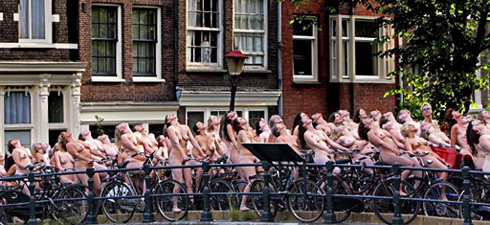You’re not allowed to drink a beer standing up at a sidewalk café in Amsterdam anymore. So last summer, thousands of people gathered for a stand-up pint-in-protest at the Noordermarkt. In mid-November another demonstration was held at the Dam (the city’s central square) against the killjoy council’s attempts to “wet-blanket” the capital. Not only that: the Stubnitz, a quondam East German ship morphed into a roving cultural centre and currently moored in Amsterdam harbour, just got its licence revoked, sparking a public debate about the city’s beleaguered subculture.
The debate was organised by a handful of alternative associations afraid of seeing underground culture get spanked right out of the city. “Amsterdam wants to be regarded as a creative metropolis,” observes Hay Scheepmakers, one of the initiators. “But all the attention is centred on the mainstream, while it’s getting harder and harder for those on the fringes.” He insists a “cultural metropolis” should also make room for fringe culture, citing as examples the Robodock art festival, which is having a hard time finding a venue, and the NDSM, an old shipyard converted into the hub of the underground art scene (250 artists of every sort work there), which has been sold to a developer.
City council no longer supports culture
The Dam demo was backed by a contingent of local restaurant and café owners. Is this, then, the birth of a new unholy alliance against the “normalcy” crusaders? As Scheepmakers sees it, “They definitely have some common interests. Whether it’s a matter of hotel, restaurant or bar licences or permits for cultural events, we see the town council becoming increasingly strict in applying the regulations. The mayor, Job Cohen, is constantly harping on ‘zero tolerance’, which ends up having repercussions on the way city hall officials oversee everything that goes on in the public sphere.”
Carolien Gehrels, head of cultural affairs in Amsterdam, begs to differ. “The rule about drinking standing up at outdoor pubs has been around for ages. It is the smoking ban (inside public venues, introduced in 2008) that fanned the flames.” And as far as she is concerned, Amsterdam remains a “lively, tolerant city”: “We’ve upped the arts budget (Kunstenplan) by 12 million, thanks to which various subcultures have thrived in Amsterdam, such as the cultural centre in the old De Volkskrant building, to give one example.” Hay Scheepmakers, who runs that centre, calls it a case in point of the so-called “normalisation” of Amsterdam: “The café inside the centre had to close owing to some minor irregularities. In the old days we’d have found a solution by negotiating with the authorities. But nowadays the council quite simply gives us the impression they don’t support cultural projects of this sort anymore.”
Was this article useful? If so we are delighted!
It is freely available because we believe that the right to free and independent information is essential for democracy. But this right is not guaranteed forever, and independence comes at a cost. We need your support in order to continue publishing independent, multilingual news for all Europeans.
Discover our subscription offers and their exclusive benefits and become a member of our community now!












